
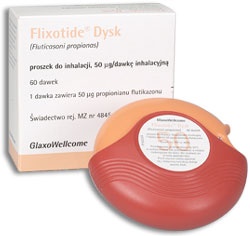
Flixotide Disk

Ask a doctor about a prescription for Flixotide Disk

How to use Flixotide Disk
Leaflet accompanying the packaging: patient information
Flixotide Disk, 50 μg/inhalation dose, inhalation powder
Flixotide Disk, 100 μg/inhalation dose, inhalation powder
Flixotide Disk, 250 μg/inhalation dose, inhalation powder
Flixotide Disk, 500 μg/inhalation dose, inhalation powder
Fluticasone propionate
Read the leaflet carefully before using the medicine, as it contains important information for the patient.
- Keep this leaflet, so you can read it again if you need to.
- If you have any doubts, consult your doctor or pharmacist.
- This medicine has been prescribed specifically for you. Do not pass it on to others. The medicine may harm another person, even if their symptoms are the same as yours.
- If you experience any side effects, including those not listed in this leaflet, tell your doctor or pharmacist. See section 4.
Table of contents of the leaflet:
- 1. What is Flixotide Disk and what is it used for
- 2. Important information before using Flixotide Disk
- 3. How to use Flixotide Disk
- 4. Possible side effects
- 5. How to store Flixotide Disk
- 6. Contents of the packaging and other information
1. What is Flixotide Disk and what is it used for
Flixotide Disk belongs to a group of medicines used in obstructive airway diseases.
The active substance of the medicine, fluticasone propionate, is a corticosteroid with local anti-inflammatory action in the lungs.
Flixotide Disk is indicated in:
- preventing asthma attacks in adults and children over 4 years old
In adults:
mild asthma - in patients who require daily symptomatic treatment with bronchodilators;
moderate asthma - unstable or worsening asthma, despite regular use of preventive asthma medications or only bronchodilators;
severe asthma - in patients with severe chronic asthma and requiring oral steroids to control asthma symptoms. Starting inhaled fluticasone propionate in many people allows for a reduction or complete discontinuation of oral steroids.
In childrenwho require preventive medication, including patients who have not responded to other available preventive medications.
- treatment of chronic obstructive pulmonary disease (COPD)
Fluticasone propionate is indicated for the treatment of COPD, in combination with a long-acting beta-agonist, such as salmeterol.
Only Flixotide Disk, inhalation powder with a strength of 250 μg/inhalation dose and 500 μg/inhalation dose, are suitable for this indication.
2. Important information before using Flixotide Disk
When not to use Flixotide Disk
- if the patient has a severe allergy to milk proteins
- if the patient is allergic to fluticasone propionate or lactose monohydrate, an excipient of the medicine.
Warnings and precautions
If asthma symptoms worsen or asthma control deteriorates, i.e.if wheezing worsens or it is necessary to use a larger number of inhalations of a rapid-acting inhalation medicine to facilitate breathing, the patient should continue using the medicine and contact their doctor immediately, who will assess the patient's condition and recommend appropriate treatment.
Flixotide Disk should not be used to interrupt a sudden asthma attack. For this purpose, a rapid-acting bronchodilator (e.g., salbutamol) should be used, which the patient should always carry with them. Care should be taken not to confuse Flixotide Disk with an inhalation medicine used as needed.
Prolonged use of Flixotide Disk may lead to suppression of the natural production of steroid hormones by the adrenal glands. This may cause a decrease in bone mass, cataracts, glaucoma, weight gain, rounding of the face (moon face), high blood pressure, slowed growth in children and adolescents.
The doctor will regularly check if the patient is not experiencing any of these side effects and ensure that the patient is using the smallest dose of Flixotide Disk that ensures control of asthma and COPD.
During the use of fluticasone propionate in recommended doses, adrenal cortex function usually remains normal. Nevertheless, in people previously treated with oral steroids, symptoms of impaired adrenal cortex function may occur. Long-term treatment with high doses of inhaled steroids may cause suppression of adrenal cortex function. Children and adolescents under 16 years of age, taking large (usually ≥1000 micrograms per day) doses of fluticasone propionate, are at particular risk. Very rare side effects may occur when taking large doses of Flixotide Disk for a long time or when suddenly stopping treatment or reducing the dose. Side effects may also occur in the event of infections or during periods of severe stress (e.g., accident or surgery). The symptoms are not usually characteristic and may include: abdominal pain, fatigue, loss of appetite, nausea and vomiting, weight loss, headache, confusion, low blood pressure, decreased glucose levels in the blood, and seizures. To prevent these symptoms, the doctor may prescribe additional corticosteroids to be taken at that time.
Due to the possibility of impaired adrenal cortex function, patients who are switching from oral steroid medications to inhaled fluticasone propionate should be under special care, and adrenal cortex function should be monitored.
After introducing fluticasone propionate into treatment, the reduction of oral steroid doses should be gradual, and patients should carry a "steroid card" informing about the need for additional oral steroids in stressful situations.
Replacing oral steroids with inhaled medications may reveal allergic symptoms, such as: allergic rhinitis or rash, which were previously treated with oral steroids. The doctor will recommend appropriate treatment.
There have been reports of an increased number of cases of pneumonia in clinical trials in patients with chronic obstructive pulmonary disease (COPD) receiving fluticasone propionate at a dose of 500 micrograms (see section 4). The doctor should monitor patients with COPD to detect whether they are developing pneumonia, as the clinical symptoms of pneumonia and COPD exacerbation may often overlap.
Very rare cases of increased glucose levels in the blood have been reported (see section 4), and the doctor should take this into account when prescribing Flixotide Disk to patients with a history of diabetes.
Do not stop treatment with fluticasone propionate suddenly.
If the patient is currently being treated or has been treated for tuberculosis, they should inform their doctor.
If the patient experiences blurred vision or other vision disturbances that may be caused by cataracts or glaucoma, they should contact their doctor.
Flixotide Disk and other medicines
Tell your doctor about all medicines you are currently taking or have recently taken, as well as any medicines you plan to take, including those available without a prescription.
It is especially important to tell your doctor about any of the following medicines you are currently taking or have recently taken:
- corticosteroids in tablets or injections
- ritonavir or cobicistat-containing medicines, used to treat HIV
- ketoconazole or itraconazole, used to treat fungal infections.
The doctor will assess whether Flixotide Disk can be used with these medicines. Some of them may enhance the effect of Flixotide Disk, and the doctor may want to closely monitor the patient's condition when taking such medicines (including some HIV medicines: ritonavir, cobicistat).
Only medicines recommended by the doctor can be used with Flixotide Disk.
Pregnancy and breastfeeding
If you are pregnant or breastfeeding, think you may be pregnant, or plan to have a child, consult your doctor before using this medicine.
The doctor will assess whether you can use Flixotide Disk during this period.
Driving and using machines
It is unlikely that side effects associated with the use of Flixotide Disk will affect your ability to drive or use machines.
Important information about some ingredients of Flixotide Disk
Each dose of Flixotide Disk contains approximately 12.5 mg of lactose. In people with lactose intolerance, this amount of lactose is unlikely to cause any problems. If you have previously been diagnosed with intolerance to some sugars, you should consult your doctor before taking the medicine.
3. How to use Flixotide Disk
This medicine should always be used as directed by your doctor. Do not take a higher dose than recommended. If in doubt, consult your doctor.
Flixotide Disk is intended for inhalation use only.
The doctor will adjust the dose of the medicine according to the individual patient's response to treatment and determine the smallest dose that ensures effective control of symptoms.
It is very important to use Flixotide Disk every day, until the doctor recommends otherwise. The therapeutic effect occurs within 4 to 7 days.
Asthma: Adults and children over 16 years old
From 100 μg to 1000 μg twice a day. The initial dose of the medicine depends on the severity of the disease.
- mild asthma: from 100 μg to 250 μg twice a day;
- moderate asthma: from 250 μg to 500 μg twice a day;
- severe asthma: from 500 μg to 1000 μg twice a day.
Children over 4 years old
From 50 μg to 100 μg twice a day. The initial dose of the medicine depends on the severity of the disease.
Children under 4 years old
Flixotide Disk is not intended for use in children under 4 years old.
Chronic obstructive pulmonary disease (COPD): Adults
500 μg twice a day, which corresponds to 1 dose of Flixotide Disk, 500 μg/inhalation dose, twice a day, or 2 doses of Flixotide Disk, 250 μg/inhalation dose, twice a day, in combination with a long-acting beta-agonist, such as salmeterol.
Only Flixotide Disk, inhalation powder with a strength of 250 μg/inhalation dose and 500 μg/inhalation dose, are suitable for this dose.
The medicine must be used daily to achieve optimal benefit, which may take from three to six months.
If there is no improvement, the patient should be re-evaluated clinically.
Special patient groups
There is no need to change the dosage in elderly patients or patients with renal or hepatic impairment.
Instructions for using the Disk inhaler
- The doctor, nurse, or pharmacist should instruct the patient on how to properly use the Disk inhaler. They should periodically check if the patient is using the Disk inhaler correctly. Not following the doctor's recommendations for using Flixotide Disk or incorrect use of the Disk inhaler may result in the medicine not producing the expected improvement in asthma or COPD.
- The Disk inhaler is packaged in a foil wrapper, which should be removed before first use and discarded.
- The Disk inhaler, when first removed from the Flixotide Disk packaging, is in the closed position.
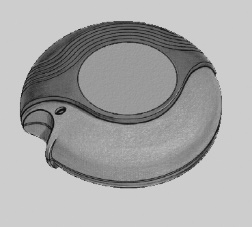
- The Disk inhaler contains the medicine in the form of consecutive doses of inhalation powder.
- The Disk inhaler is equipped with a dose counter, which indicates how many doses of the medicine are left in the inhaler. The counter shows the dose number down to 0, and numbers from 5 to 0 appear in red to warn that there are only a few doses of the medicine left in the inhaler. If the counter shows 0, it means that the Disk inhaler is empty.
Using the Disk inhaler
After sliding the Disk inhaler's slider, a small hole appears in the mouthpiece, and the dose of the medicine is ready for inhalation. After closing the Disk inhaler, the slider automatically returns to its original position, and the outer cover protects the Disk when not in use. To use, follow the steps below:
- 1. OPENING: To open the Disk inhaler, hold the cover with one hand and place your thumb in the indentation on the case. Slide your thumb in the indentation away from you - until it clicks.
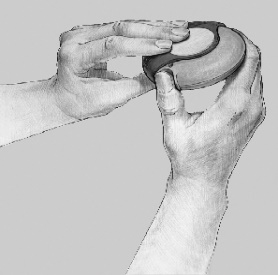
- 2. SETTING THE DOSE: Hold the Disk inhaler with the mouthpiece facing you. You can hold it with either your right or left hand. Slide the slider away from you until it clicks. The Disk inhaler is ready for use. Each time the lever is slid, the next dose of powder is prepared for inhalation. Do not play with sliding the slider, as this will open the next dose and reduce the number of doses of the medicine available for inhalation.
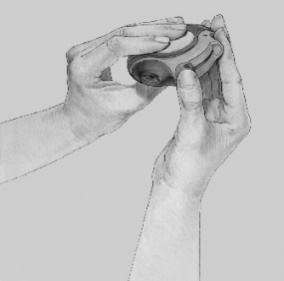
- 3. INHALING: Before inhaling the medicine (breathing in), carefully read the following instructions.
- Hold the Disk inhaler away from your mouth and breathe out gently. Do not breathe out into the Disk inhaler.
- Put the mouthpiece in your mouth; breathe in deeply from the Disk inhaler through your mouth, not through your nose.
- Hold your breath, remove the Disk inhaler from your mouth. Hold your breath for about 10 seconds or as long as it is comfortable, then breathe out gently.
- Patients may not feel the medicine or its taste, even if they are using the Disk inhaler correctly.

- 4. CLOSING:
- To close the Disk inhaler, place your thumb in the indentation on the case and slide it towards you.
- When closing the Disk inhaler, you will hear a "click". The dose-setting slider automatically returns to its original position. The Disk inhaler is ready for reuse.
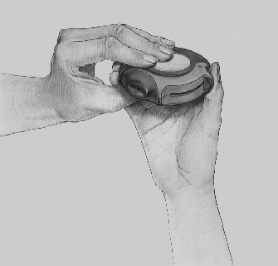
Rinsing your mouth with water and spitting it out after inhaling the medicine helps prevent hoarseness and thrush.
Cleaning
To clean the Disk inhaler's mouthpiece, wipe it with a dry, soft cloth.
Using a higher than recommended dose of Flixotide Disk
In the event of using a higher than recommended dose of Flixotide Disk, contact your doctor or pharmacist immediately for advice.
It is important to use the doses of the medicine as recommended by your doctor. Do not increase or decrease the dose without consulting your doctor.
Using higher than recommended doses of fluticasone propionate may cause transient suppression of adrenal cortex function.
Long-term use of higher than recommended doses of fluticasone propionate may lead to adrenal insufficiency.
Missing a dose of Flixotide Disk
It is very important to take the recommended dose of the medicine every day to ensure the greatest effectiveness of the treatment.
If a dose is missed, take the medicine as soon as possible. Continue treatment as before.
Do not take a double dose to make up for the missed dose.
Stopping treatment with Flixotide Disk
It is very important to take Flixotide Disk every day until your doctor recommends stopping the treatment. Do not stop taking Flixotide Disk suddenly, as the symptoms of the disease may worsen, and hormonal disturbances may occur in the body.
If you have any further doubts about using this medicine, consult your doctor or pharmacist.
4. Possible side effects
Like all medicines, Flixotide Disk can cause side effects, although not everybody gets them.
The following side effects have been observed in patients taking Flixotide Disk.
Allergic reactions: seek medical help immediately
Allergic reactionsto Flixotide Disk, which occur uncommonly ( may affect 1 to 10 in 1000 patients taking the medicine). They are characterized by symptoms such as:
- Hives or redness of the skin.
Allergic reactionsto Flixotide Disk, which occur very rarely ( may affect less than 1 in 10,000 patients taking the medicine), and in a small number of patients, these reactions may develop into a serious condition, potentially life-threatening, if not treated. They are characterized by symptoms such as:
- Swelling (mainly of the face, lips, mouth, tongue, or throat), which can cause difficulty swallowing or breathing.
- Sudden onset of breathing difficulties or sudden worsening of wheezing (bronchospasm).
- Sudden feeling of weakness or dizziness (which may lead to falls or loss of consciousness).
In the event of such symptoms, stop using the medicine and seek medical help immediately.
Pneumonia (lung infection) in patients with chronic obstructive pulmonary disease (COPD) (common side effect)
Tell your doctorif any of the following symptoms occur while using Flixotide Disk - they may be symptoms of a lung infection:
- Fever or chills.
- Increased production of sputum or change in its color.
- Worsening cough or increased breathing difficulties.
Other side effects:
Very common side effects( may affect more than 1 in 10 patients):
- Thrush (painful, creamy-white patches) in the mouth and throat, difficulty swallowing. Rinsing your mouth with water and spitting it out after each inhalation may be helpful. Your doctor may also recommend an antifungal medicine to treat thrush.
Common side effects( may affect 1 to 10 in 100 patients):
- Hoarseness, loss of voice. Rinsing your mouth with water and spitting it out after each inhalation may be helpful.
- Pneumonia has been reported in patients with COPD - see above.
- Easy bruising.
Rare side effects( may affect 1 to 10 in 10,000 patients):
- Thrush of the esophagus.
Very rare side effects( may affect less than 1 in 10,000 patients):
- Flixotide Disk, inhalation powder may have a suppressive effect on the normal production of steroid hormones by the body, particularly when taking large doses of the medicine for a long time. Symptoms include slowed growth in children and adolescents, decreased bone mass, cataracts, glaucoma, weight gain, rounding of the face (moon face), high blood pressure, and other symptoms.
- Increased glucose levels in the blood (hyperglycemia). In patients with diabetes, it may be necessary to monitor glucose levels in the blood more frequently and adjust the dose of antidiabetic medicines being taken.
- Joint pain.
- Nausea.
- Anxiety, sleep disturbances, and changes in behavior, including hyperactivity and irritability. The occurrence of these side effects is more likely in children.
Side effects with unknown frequency( frequency cannot be estimated from the available data):
- Depression and aggression. The occurrence of these side effects is more likely in children.
- Nosebleeds.
- Blurred vision.
Reporting side effects
If you experience any side effects, including those not listed in this leaflet, tell your doctor or pharmacist, or nurse. Side effects can be reported directly to the Department of Adverse Reaction Monitoring of Medicinal Products, Medical Devices, and Biocidal Products:
Al. Jerozolimskie 181C
02-222 Warsaw
Phone: +48 22 49 21 301
Fax: +48 22 49 21 309
Website: https://smz.ezdrowie.gov.pl
By reporting side effects, you can help gather more information on the safety of the medicine.
Side effects can also be reported to the marketing authorization holder or its representative.
5. How to store Flixotide Disk
Store at a temperature not exceeding 30°C.
Store out of sight and reach of children.
Do not use this medicine after the expiry date stated on the packaging after EXP.
The expiry date refers to the last day of the month.
The batch number of the medicine is stated on the packaging: Lot.
Medicines should not be disposed of via wastewater or household waste. Ask your pharmacist how to dispose of medicines that are no longer needed. This will help protect the environment.
6. Contents of the packaging and other information
What Flixotide Disk contains
- The active substance of the medicine is fluticasone propionate micronized. One dose of the medicine contains 50, 100, 250, or 500 μg (micrograms) of fluticasone propionate micronized.
- The other ingredient is lactose monohydrate (which contains milk proteins).
What Flixotide Disk looks like and contents of the packaging
Flixotide Disk is a powder for inhalation.
The packaging contains 60 doses of the medicine in the form of powder, placed in a multi-layered foil in a plastic container (Disk inhaler), equipped with a mouthpiece and dose counter, packaged in a foil wrapper, in a cardboard box.
Marketing authorization holder: Manufacturer:
GlaxoSmithKline Trading Services Limited
12 Riverwalk
Citywest Business Campus
Dublin 24
D24 YK11
Ireland
- 1. Glaxo Wellcome Production Zone Industrielle No. 2 23, rue Lavoisier 27000, Evreux France
To obtain more detailed information, contact the representative of the marketing authorization holder:
GSK Services Sp. z o.o.
ul. Rzymowskiego 53
02-697 Warsaw
phone: (22) 576-90-00
{ Logo of the marketing authorization holder}
Date of last revision of the leaflet: January 2025
- Country of registration
- Active substance
- Prescription requiredYes
- ImporterGlaxo Wellcome Production
- This information is for reference only and does not constitute medical advice. Always consult a licensed doctor before taking any medication. Oladoctor is not responsible for medical decisions based on this content.
- Alternatives to Flixotide DiskDosage form: Powder, 250 mcg/dose inh.Active substance: fluticasonePrescription requiredDosage form: Powder, 500 mcg/dose inh.Active substance: fluticasonePrescription requiredDosage form: Powder, 100 mcg/dose inh.Active substance: fluticasonePrescription required
Alternatives to Flixotide Disk in other countries
The best alternatives with the same active ingredient and therapeutic effect.
Alternative to Flixotide Disk in Ukraina
Alternative to Flixotide Disk in Hiszpania
Online doctors for Flixotide Disk
Discuss dosage, side effects, interactions, contraindications, and prescription renewal for Flixotide Disk – subject to medical assessment and local rules.















